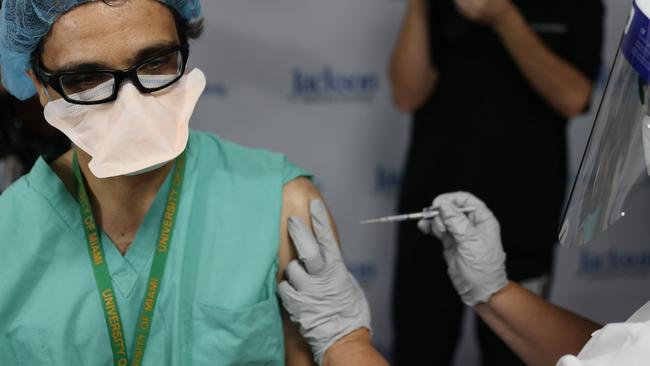James Campbell: Federal government’s COVID-19 vaccination is flawed
The long-awaited COVID-19 vaccine is just months away — but Australia’s rollout is an accident waiting to happen. This is why.
James Campbell
Don't miss out on the headlines from James Campbell. Followed categories will be added to My News.
The federal government’s vaccine rollout strategy is an accident waiting to happen.
On the face of it, using GPs and pharmacies to maximise the points of distribution makes sense in a country as large and diverse as Australia.
But it is a strategy with risks which is why some countries have already rejected it. A mass society-wide vaccination program on this scale has never been attempted before.
We need to get this right. Looking at this plan, it is hard not to suspect that Australia’s blighted federal-state relations have played a role in its conception.
The two vaccines Australia is likely to have available in the first half of next year – AstraZeneca/Oxford University and Pfizer/BioNTech – need to be handled very differently. Pfizer’s product, which is already being rolled out in the UK has to be stored at -70C – which will mean it needs to be transported from central storage facilities using dry ice.

When it is removed from dry ice, it needs to be moved to a special freezer or refrigerator within 90 seconds.
It can be stored there for up to five days but once it’s removed, it needs to be injected within two hours, or it will spoil.
In other words, there’s plenty that can go wrong. And the more points of distribution you have, the greater the chance that something will go wrong.
Add to which, GPs will be administering multiple doses of two different vaccines which have to be delivered at the correct intervals. All while getting on with their normal jobs of treating their patients.
You can see why Germany has rejected the path Australia is going down.
The Germans, who know a thing or two about efficiency, have decided the best way to get the job done is to centralise the vaccine’s distribution.
That is why they have already begun setting up mass vaccination centres in disused airports and sports stadiums around the country even before German regulators have approved a vaccine.
Berlin, for example, will have six. Germany, like Australia, is a federation and bulk of this work is being done by the states.
By opting to distribute the vaccines via GPs, which they regulate, the federal government is cutting the states out of the process.
You can see why they might have been tempted to do this given the recent experiences of hotel quarantine and case tracing in Victoria.
But in cutting the states’ public health departments out of the process, the Commonwealth is also cutting out the public health teams that have been running the testing programs successfully, and who also happen to have the most experience of running vaccination programs in Australia.





